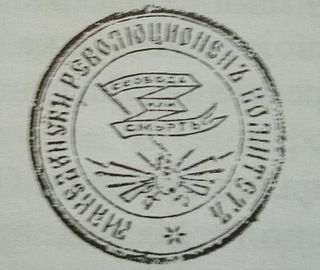
The Internal Macedonian Revolutionary Organization, was a secret revolutionary society founded in the Ottoman territories in Europe, that operated in the late 19th and early 20th centuries.

Georgi Nikolov Delchev, known as Gotse Delchev or Goce Delčev, was an important Macedonian Bulgarian revolutionary (komitadji), active in the Ottoman-ruled Macedonia and Adrianople regions at the turn of the 20th century. He was the most prominent leader of what is known today as the Internal Macedonian Revolutionary Organization (IMRO), a secret revolutionary society that was active in Ottoman territories in the Balkans at the end of the 19th and the beginning of the 20th century. Delchev was its representative in Sofia, the capital of the Principality of Bulgaria. As such, he was also elected a member of the Supreme Macedonian-Adrianople Committee (SMAC), participating in the work of its governing body. He was killed in a battle with an Ottoman unit on the eve of the Ilinden-Preobrazhenie uprising.

Krste Petkov Misirkov was a philologist, journalist, historian and ethnographer from the region of Macedonia.
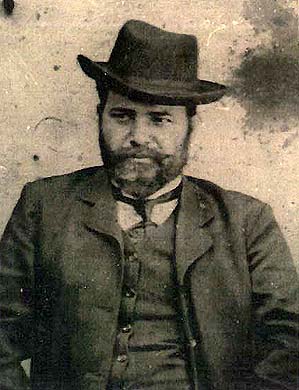
Petar Pop-Arsov originally spelled in older Bulgarian orthography: Петъръ попъ Арсовъ; was a Bulgarian educator and revolutionary from Ottoman Macedonia, one of the founders of the Internal Macedonian Adrianople Revolutionary Organization (IMARO), known in its early times as Bulgarian Macedonian-Adrianople Revolutionary Committees (BMARC). Although he was Bulgarian teacher and revolutionary, and thought of his compatriots as Bulgarians, according to the post-WWII Macedonian historiography, he was an ethnic Macedonian.

Metodija Andonov-Čento was a Macedonian statesman, the first president of the Anti-Fascist Assembly of the National Liberation of Macedonia and of the People's Republic of Macedonia in the Federal People's Republic of Yugoslavia after the Second World War. In Bulgaria he is often considered a Bulgarian.

Panko Brashnarov was a revolutionary and member of the left wing of the Internal Macedonian-Adrianople Revolutionary Organization (IMARO) and IMRO (United) later. As with many other IMARO members of the time, historians from North Macedonia consider him an ethnic Macedonian, whereas historians in Bulgaria consider him a Bulgarian. However such Macedonian Bulgarian activists, who came from the IMARO and the IMRO (United) never managed to get rid of their strong pro-Bulgarian bias, and continued to see themselves as Bulgarians, even in Communist Yugoslavia.

Supreme Macedonian-Adrianople Committee (SMAC),, also known as Supreme Macedonian Committee was a Bulgarian paramilitary and political organization, active in Bulgaria as well as in Macedonia and Thrace regions of the Ottoman Empire. It was based in Bulgaria from 1895 to 1905. Macedonian Bulgarian and Thracian Bulgarian emigrants in Bulgaria were a great number. Led by Trayko Kitanchev, they formed in 1895 the “Macedonian-Adrianople Organization”, at the head of which was “Supreme Macedonian-Adrianople Revolutionary Committee”. Its official declaration was also a struggle for autonomy of Macedonia and Thrace. At the same time, being impatient for the liberty to come sooner, and strongly convinced that it would come only with the help of the Bulgarian Army. Later they directed their efforts in activities for involving the country into war with the Ottoman Empire as for example during the Supreme Macedonian Committee chetas' action in 1895, and the Gorna Dzhumaya Uprising in 1902. As a rule most of the leaders were with stronger connections with the governments. At the end their main idea was, waging struggle for a direct unification with Bulgaria.
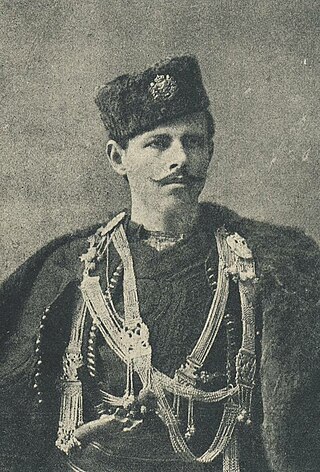
Dimche Sarvanov, also Dimko Mogilcheto or Dimche Mogilche, was a Macedonian Bulgarian revolutionary and a member of the Internal Macedonian-Adrianople Revolutionary Organization.
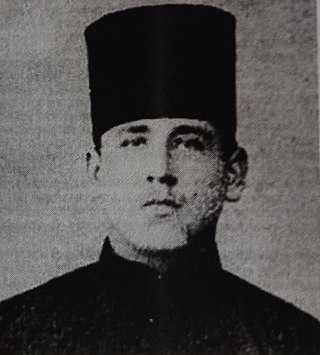
Mile Popyordanov (1877-1901), born Milan Popyordanov, was a Macedonian Bulgarian revolutionary and member of the Internal Macedonian-Adrianople Revolutionary Organization (IMARO).

Hristo Dimitrov Uzunov was a Macedonian Bulgarian teacher and revolutionary, head of the Ohrid branch of the Internal Macedonian Revolutionary Organization and its ideological leader in the Ohrid region.
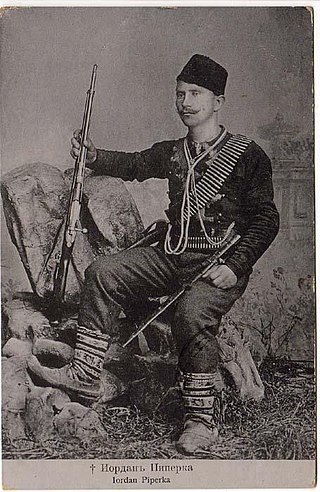
Yordan Piperkov (1870–1903), widely known as Yordan Piperkata, was a Macedonian Bulgarian revolutionary from the early 20th century, member of the Supreme Macedonian-Adrianople Committee and later of the Internal Macedonian-Adrianople Revolutionary Organization (IMARO).

Mihail Raynov Apostolov, also known as Mihal Postolov or Popeto, was an officer in the Bulgarian army and a worker of the Internal Macedonian-Adrianople Revolutionary Organization (IMARO).

Lazar Poptraykov was a Macedonian Bulgarian revolutionary (komitadji). He was also a Bulgarian Exarchate teacher and poet from Ottoman Macedonia. He was one of the leaders of the Internal Macedonian-Adrianople Revolutionary Organization (IMARO) in the region of Kastoria (Kostur) during the Ilinden Uprising. Despite his Bulgarian identification, per post-WWII Macedonian historiography he is considered as an ethnic Macedonian.

The Kostur dialect, is a member of the Southwestern subgroup of the Southeastern group of dialects of the Macedonian language. This dialect is mainly spoken in and around the town of Kastoria, known locally in Macedonian as Kostur, and in the surrounding Korešta region, which encompasses most of the area to the northwest of the town. The Kostur dialect is also partially spoken in Albania, most notably in Bilisht and the village of Vërnik (Vrabnik). The dialect is partially preserved among the ″people of Bulgarian origin in Mustafapaşa and Cemilköy, Turkey, descending from the village of Agios Antonios (Zhèrveni) in Kostur region ″.

Petar (Pere) Naumov Toshev (1865-1912) was a Bulgarian teacher revolutionary and activist of the Internal Macedonian-Adrianople Revolutionary Organization. In North Macedonia he is considered an ethnic Macedonian revolutionary.
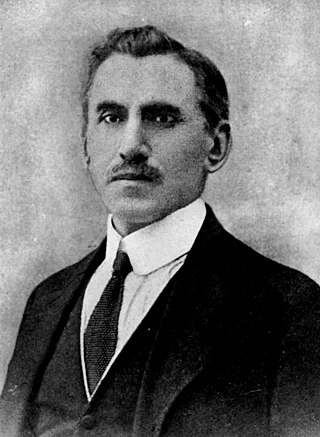
Ivan Shishmanov was a Bulgarian writer, ethnographer, politician and diplomat. He served as Ambassador of Bulgaria to the Ukrainian State and the Ukrainian People's Republic.

Svoboda ili smart, written in pre-1945 Bulgarian orthography: "Свобода или смърть" and before 1899: "Свобода или смъртъ", was a revolutionary slogan used during the national-liberation struggles by the Bulgarian revolutionaries, called comitadjis. The slogan was in use during the second half of the 19th and the first half of the 20th centuries.

Toma Kostov Davidov was a Bulgarian Army officer and participant in the Macedonian Revolutionary Movement, a vojvode of the Macedonian Supreme Committee, later becoming a commander in the Internal Macedonian Revolutionary Organization.
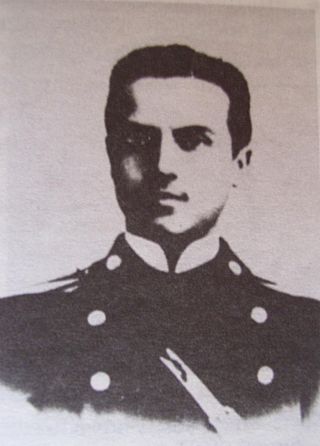
Milan Trajkov Stoilov was a socialist revolutionary from the region of Macedonia. According to Macedonian historians, he was a Macedonian activist. However according to Bulgarian historians, he is regarded as a Bulgarian revolutionary.
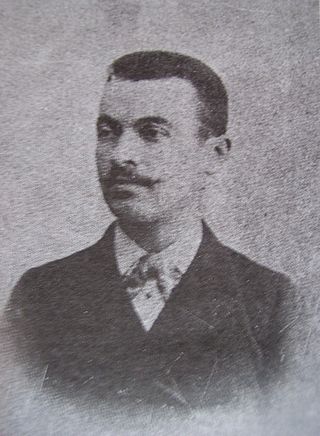
Stefan Jakimov Dedov was a journalist, writer and early proponent of the Macedonian Slavs' ethnonational distinctiveness. He expressed publicly the idea of a Macedonian nation distinct from Bulgarians, as well as a separate Macedonian language. Though, he self-identified occasionally as a Bulgarian too.